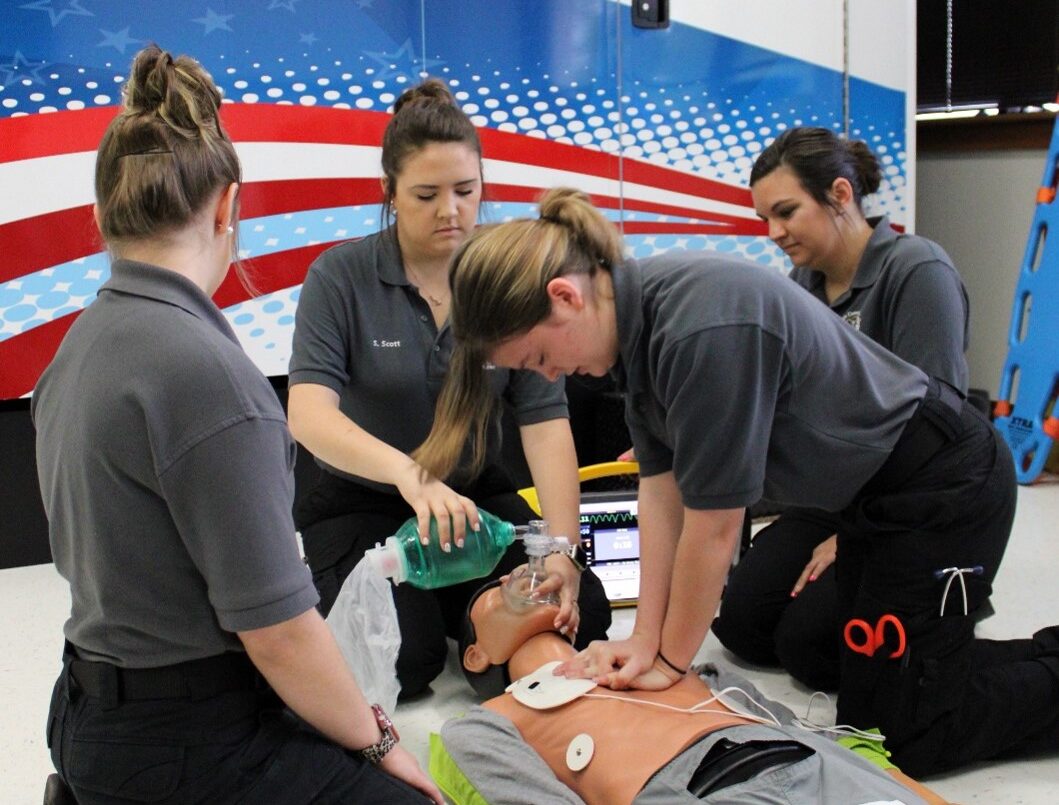The Spring semester saw major academic changes, for both students and faculty at Sampson Community College. With nearly all programs forced to move online, clinical locations for healthcare programs restricting access from students, and the Basic Law Enforcement (BLET) program scrambling to find locations for several pieces of training, instructors and students were left uncertain. However, things came together when students in each program graduated from their respective programs and took their licensing and certification exams. The BLET, Medical Assisting, Practical Nursing, Associate Degree Nursing, Emergency Medical Science, Cosmetology, and Manicuring and Natural Hair Care programs all received 93% or better on licensing and certification exams.
After completing 36 blocks of instruction, and passing the Police Officer Physical Agility Test, Basic Law Enforcement Training students must take the BLET State Comprehensive Written Examination. This exam consists of six parts: Legal Unit, Patrol Duties, Law Enforcement Communication, Investigation, Practical Application, and Sheriff-Specific Unit. Students must pass with a 70%.

This Fall and Spring, the BLET classes at Sampson Community College far exceeded this expectation. Students in the Fall 2019 Night class achieved a 96% passage rate, with nearly all students completing this expectation. For the Spring 2020 Day class, 100% of students passed the state exam. For Director of the BLET program, Anthony Davis, and his instructors, this feat reflected the hard work of these students.
“Our BLET program is intense and I’m able to see the fruition of hard work and dedication that the students display on a daily basis. There are many times that students get overwhelmed because even though they are enrolled in BLET they still have life happening at home. Seeing the student accomplish this course with work, kids, life, and other responsibilities is astonishing because I know the effort and dedication that it takes to make it to graduation,” Davis expressed.
Sampson Community College hosts several healthcare programs, including Medical Assisting, Practical Nursing, and Associate Degree Nursing. Testing sites for all exams paid special attention to decrease seating capacity, monitor infection control, and screen before entering exam sites.
Students in the Medical Assisting (MA) program take a 200-item exam, where they are tested on general knowledge, mastery, and more. Medical Assisting students are certified through the American Association of Medical Assistants. All six graduates of the Medical Assisting program passed the exam, giving the program a 100% passing rate.
Nursing students, both in the Practical Nursing and the Associate Degree Nursing programs, take the NCLEX-RN or NCLEX-PN exam, which is a 130-item exam, testing critical thinking, entry-level nursing skills, and nursing judgment. The 20 SCC Practical Nursing graduates passed the NCLEX-PN exam on the first attempt. Of the 43 Associate Degree Nursing graduates, 95% passed on the first attempt, and the remaining 5% on the second attempt.
Healthcare programs division chair, Dr. Veronica Stevens, and her team expressed their pride in their students, saying their achievement means they’ve completed their educational goals at SCC.
“The students’ success is our success…Our graduates are highly sought after by employers. Their program completion and licensure/certification here means they can move into the career paths or transition into the next level of educational endeavors,” Stevens stated.

Another healthcare program experiencing success was the Emergency Medical Science (EMS) curriculum program. Students in this program can take the North Carolina State Paramedic Exam OR the students may sit for the National Registry Paramedic Exam. Graduates are tested on Operations, Preparatory, Medical/Trauma Emergencies, Special Population, Cardiology, Obstetrics/Gynecology, Pediatrics, and Geriatrics.
In preparation for the exam, EMS instructors at SCC held several study sessions. Graduates of the Associate of Applied Science in Emergency Medical Science achieved a passage rate of 100%.
The Cosmetology program also saw success. Students in the short-term training course for Manicuring and Natural Hair Care completed the program with 300 hours, then prepared to take a practical exam and a theoretical exam in hopes of receiving a certificate in these skills. Each student in this course at SCC received a passing score, giving the program a 100% passage rate.

Graduates of the Associate of Applied Science in Cosmetology complete up to 1200 or 1500 hours of required performances while being enrolled in the courses here at SCC, depending on their enrolled program. Upon completion of their program, graduates take the National NIC Cosmetologist & Apprentice Cosmetologist Written Examination and the National NIC Cosmetologist Practical Examination. 93% of Cosmetology graduates at SCC passed the exam this year.
“I’m very elated to hear our students passed with and 100% to 93% passing rate. This shows how dedicated our instructors are preparing their students with competency education and professional ethics,” said Department Chair, Loreta Jones.
Even amidst changing academic schedules, a move to online coursework, and more, students in each of these programs went above and beyond and excelled this year.
About Sampson Community College: Sampson Community College is a member of the North Carolina Community College System, located in Clinton, NC in Sampson County. The college offers many programs to include two-year degrees, college transfer, continuing education and workforce development options, and early college education.

